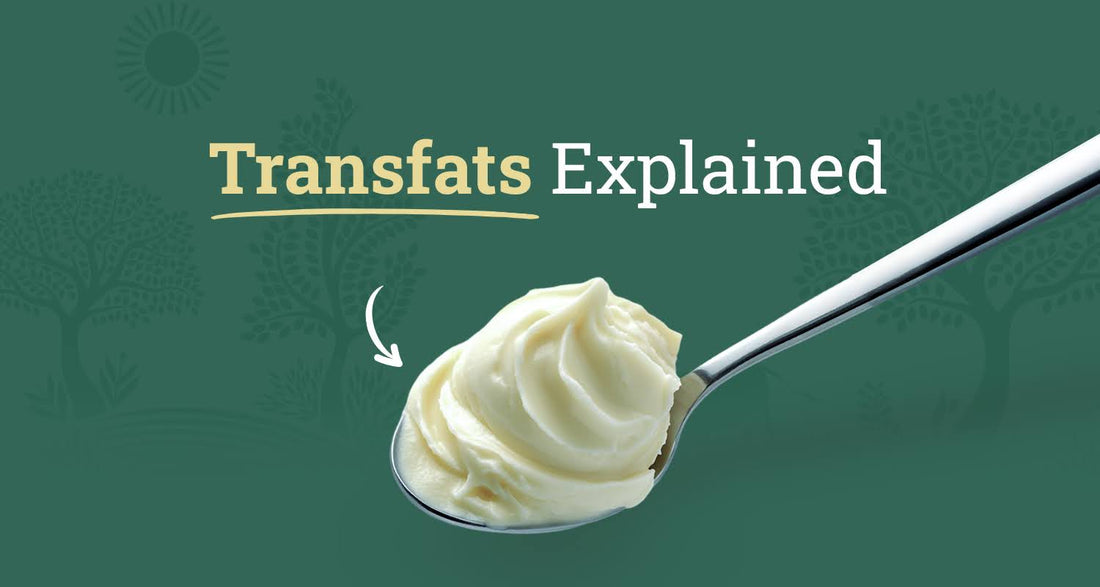
Trans Fats Explained: Health Risks, Scientific Facts & How to Avoid Them
Share
The Science Behind Trans Fats
Everything on your plate today can be traced back to a groundbreaking science experiment that changed oil production at the turn of the century.
Scientists discovered a process to convert liquid oils into solid or semi-solid fats. This process, known as partial hydrogenation, involves heating oils in the presence of metal catalysts and hydrogen gas. During this process, some bonds are saturated, and others are altered into a trans configuration a structural change that results in what we know as trans fats.
Trans fats are often created during the production of margarine, shortening, and oils for deep frying. These artificial fatty acids can make up to 40% of the total fat content in these products.
But why are trans fats so harmful to your health?
What Are The Dangers Of Trans Fats?
Over the last decade, numerous studies have shown that trans fats are not just harmful they are twice as damaging to heart health as saturated fats. These fats, commonly found in processed snacks, baked goods, and fried foods, wreak havoc on your cholesterol and cardiovascular health.
A notable study from the Netherlands by Mensink and Katan compared the effects of trans fats and saturated fats on blood cholesterol levels. Here’s what they found:
Trans Fats (at 10% of dietary energy):
-
Increase LDL (bad cholesterol)
-
Decrease HDL (good cholesterol)
Saturated Fats:
-
Increase LDL
-
Do not reduce HDL
Even more concerning? Trans fats significantly worsen the total/HDL cholesterol ratio, a key marker of cardiovascular risk nearly twice as much as saturated fats.
What Trans Fats Do to Your Body: The Impact on Health
Trans fats are dangerous not just because of how they affect your cholesterol profile, but also due to their widespread impact on multiple aspects of your health. Here’s how they harm your body:
1. Worsen Cholesterol Profile
-
Increase LDL (bad cholesterol) and decrease HDL (good cholesterol), which can increase the risk of heart disease.
-
Raise total cholesterol/HDL ratio, a critical indicator of heart health.
2. Trigger Inflammation
-
Elevate CRP, IL-6, and TNF, all of which are markers of chronic inflammation, a leading cause of cardiovascular and other chronic diseases.
3. Damage Blood Vessels
-
Trans fats impair endothelial function, leading to reduced vascular health, which can contribute to high blood pressure and other heart conditions.
4. Affect Insulin Sensitivity
-
Linked to increased insulin resistance, especially in individuals with belly fat or low activity levels.
-
May contribute to weight gain and increase the risk of diabetes.
5. Raise Triglycerides
-
Promote smaller, denser LDL particles, further increasing cardiovascular risk.
How to Avoid Trans Fats: Tips for a Healthier Diet
Trans fats are found in many processed foods, such as:
-
Packaged snacks (chips, namkeens, bhujia, and biscuits)
-
Baked goods (cookies, cakes, pastries)
-
Fried foods
-
Highly refined oils processed in high heat
To avoid trans fats:
-
Check labels for "partially hydrogenated oils" even if the label says "0g trans fat," it could still contain trace amounts.
-
Opt for natural oils like olive oil (rich in oleic acid), avocado oil, or coconut oil for cooking and dressings.
-
Limit processed foods and choose whole foods to naturally reduce your intake of harmful fats.
The Bottom Line on Trans Fats
Trans fats are dangerous because they have a direct impact on heart health, cholesterol levels, inflammation, and even insulin sensitivity. Unlike other fats, they don’t just add empty calories to your diet they actively harm your health.
The next time you shop, look out for "partially hydrogenated oils" and choose healthier alternatives to protect your heart and overall well-being.
-
Trans fats are more harmful than saturated fats for heart health.
-
They increase LDL, decrease HDL, and disrupt your cholesterol profile.
-
Trans fats also trigger inflammation, damage blood vessels, and impair insulin sensitivity.
-
To avoid trans fats, read labels and opt for natural oils and whole foods.












 You saved ₹-48 on this order
You saved ₹-48 on this order
